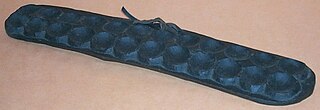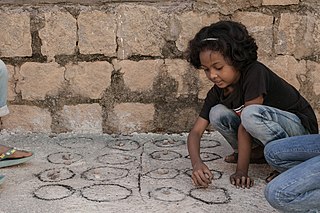
Enkeshui (or Engesho) is a traditional mancala game played by the Maasai of both Kenya and Tanzania. It is a rather complex mancala game, and bears some similarities to the Layli Goobalay mancala played in Somaliland.

Enkeshui (or Engesho) is a traditional mancala game played by the Maasai of both Kenya and Tanzania. It is a rather complex mancala game, and bears some similarities to the Layli Goobalay mancala played in Somaliland.
Enkeshui can be played using a mancala board of different sizes, as long as they have two rows of pits (i.e., it is a "Mancala II" game). The number of pits in each row may vary; it is usually 8, 10, or 12. 48 seeds are used. As for many traditional mancala games, it is unclear whether the initial setup is fixed or if it may be chosen by an agreement between the players. Anyway, some of the most typical setups for 2x12 and 2x18 boards are like this:
To choose which player will move first, an initial "sowing race" takes place. Both players take all the seeds from one of their pits and relay-sow them concurrently. The first player who finishes sowing will be the first to play in the remainder of the game. Notice that since the initial race is concurrent, its outcome is quite unpredictable. Thus, each game will actually begin (after the race) with a different initial setup.
After the initial race, players will take turns. At his turn, the player takes all the seeds from one of his pits and sows them counterclockwise. Depending on where the last seed of the sowing is dropped, the following rules may apply:
A couple of additional rules also apply:
Some pits may become "bulls". If the last seed of sowing is dropped in a pit holding 3 seeds, the pit becomes a "bull" belonging to this player. Also, if the last two seeds in sowing are dropped in two pits that hold 2 and 3 seeds, or 3 and 2 seeds, both pits become bulls of this player. Seeds in a bull can never be removed. Every time sowing ends up with the last seed being dropped in a bull, the player's turn is over. Every time sowing ends up in such a way to cause capture (see above), but the seeds that should be captured are in a bull, the capture does not take place and the turn is over.
The game ends when one of the players cannot move anymore, because he has no seeds in his row or because he only has seeds in bull pits. The opponent then captures all the seeds in his row, except for those in bull pits; seeds in bull pits will be captured by the player owning the bull. The player who captured most seeds wins the game.
There are several symbolic elements in Enkeshui rules. The total number of seeds, "48" (the number of seeds), is considered of good auspice in Maasai culture. The number of pits per row is always even; this is related to the fact that even numbers are considered "feminine". Most of the game's terminology is based on metaphors that are related to cattle farming: seeds are cows, pits are enclosures, and some pits are "bulls". Note that the same cattle-based metaphors are used for mancalas found in completely unrelated (but also pastoral) cultures, such as the Mongolian game Unee tugaluulax.
Enkeshui games are social events in Maasai's villages. Usually, the game is played by teams; while an individual player must be selected from each team to actually move, the team maintains the right to deny its support to this player (and replace him) and even withdraw his move if there is no consensus over it. Since the rules are quite complex, and Maasais usually play as fast as possible, illegal moves may occur either as a result of a player's mistake or his actual intent to cheat; in either case, it is the opponents' responsibility to detect the illegal move and withdraw it. Non-playing people may also intervene, and often bet on the winner. The system of social rules defining "good manners" in relation to Enkeshui (both for players and observers) is quite complex and difficult to grasp for young people as well as strangers.

Mancala refers to a family of two-player turn-based strategy board games played with small stones, beans, or seeds and rows of holes or pits in the earth, a board or other playing surface. The objective is usually to capture all or some set of the opponent's pieces.

Oware is an abstract strategy game among the mancala family of board games played worldwide with slight variations as to the layout of the game, number of players and strategy of play. Its origin is uncertain but it is widely believed to be of Ashanti origin.

Kalah is a modern variation in the ancient Mancala family of games, the oldest known version having been found carved into a stone tablet in the 16th-century BCE pyramid of Cheops. The Kalah variation was developed in the United States by William Julius Champion, Jr. in 1940. This game is sometimes also called "Kalahari", possibly by false etymology from the Kalahari desert in Namibia.

Bao is a traditional mancala board game played in most of East Africa including Kenya, Rwanda, Tanzania, Comoros, Malawi, as well as some areas of DR Congo and Burundi. It is most popular among the Swahili people of Tanzania and Kenya; the name itself "Bao" is the Swahili word for "board" or "board game". In Tanzania, and especially Zanzibar, a "bao master" is held in high respect. In Malawi, a close variant of the game is known as Bawo, which is the Yao equivalent of the Swahili name.

Owela, also referred to by the Khoekhoe language loanword ǁHus, is the Oshiwambo name of a traditional mancala board game played by the Nama people, Herero people, Rukwangali speakers, and other ethnic groups from Namibia. It is related to the Omweso family of mancala games played in Eastern and Southern Africa. Although this is an abstract strategy game, the consequences of individual moves are so hard to predict that it can be considered, to some extent, a game of chance.
Andada is a traditional mancala game played by the Kunama people of western Eritrea. It closely resembles other mancalas from East Africa such as Enkeshui and Layli Goobalay.
Anywoli is a traditional mancala game played by the Anuak people of the Gambela province, in Ethiopia, as well as in the Akobo, Pochalla and Jokau regions of Sudan. The name of the game means "bringing to life". Anywoli has similarities to mancalas found in Nigeria and Ghana, such as Ba-awa and Obridjie.
Aw-li On-nam Ot-tjin is a traditional mancala game played by the Penihing people of Borneo. The first transcription of the rules of the game was completed by norwegian ethnographist Carl Sofus Lumholtz. Despite its origin, Otjin is similar to african mancalas such as Ba-awa (Ghana) and quite different than most Asian mancalas.

Ayo is a traditional mancala played by the Yoruba people in Nigeria. It is very close to the Oware game that spread to the Americas with the atlantic slave trade. Among modern mancalas, which are most often derived from Warri, the Kalah is a notable one that has essentially the same rules as Ayo.

Endodoi is a traditional mancala game played by the Maasai people of Kenya and Tanzania. It is very close to the Ayoayo game of the Yoruba people of Nigeria, although there is no evidence of a direct relationship between the two. Maasai are known to play Endodoi very quickly, to the point that an external observer may find it hard to even distinguish individual moves and turns.
Hawalis is a traditional mancala game played in Oman as well as Zanzibar, where it is known as Bao la Kiarabu, with slightly different rules. It is closely related to African mancalas such as Bao, Njomba, Lela, Mulabalaba (Zambia), Muvalavala (Angola) and Tschuba.
Daramutu is a traditional mancala game from Sri Lanka. It was first described in 1909 by the British engineer Henry Parker in his book Ancient Ceylon (1909). Traditionally, the game is only played by women.
El Arnab is a traditional Arab solitaire based on the general equipment and gameplay of mancala games. It is played by the Kababish people of Sudan. The name "El Arnab" means "the rabbit".
En Gehé is a traditional mancala game played by the Loitha and Kisonga Maasai groups of northern Tanzania. The game was first described in 1904 by a German soldier, Moritz Merker, who was serving in the Kaiserlichen Schutztruppe in German East Africa. Merker later became the first ethnologist to study the Maasai culture.
Isolo is a traditional mancala game played by the Sukuma people in northern Tanzania. The rules of the game come in three variants, respectively for women, boys and men.

Katro is a traditional mancala game played by the Betsileo people in the Fianarantsoa Province of Madagascar. The game was first described by Alex de Voogt in 1998.
Kiothi is a traditional mancala game played by the Meru people in Kenya. The word "kiothi" simply means "to place". This mancala is closely related to the Enkeshui and the Giuthi mancalas, respectively played by the Maasai, the Kikuyu and Embu people.
Lamlameta is a traditional mancala game played by the Konso people living in the Olanta area of central Ethiopia. It was first described in 1971 by British academic Richard Pankhurst. It is usually played by men. The name "Lamlaleta" means "in couples".

Layli Goobalay is a board game played in parts of Somalia. It is a variant of the classical count and capture game mancala, which is one of the oldest two-player strategy board games played throughout the world. Layli Goobalay means "to exercise with circles" in the Somali language.
Mbothe is a traditional mancala game played by the Pokomo people that live along the Tana River, in Kenya. Pokomo do not traditionally build gameboards; they dig pits in the ground and use small stones as counters.